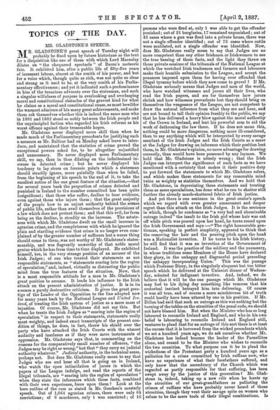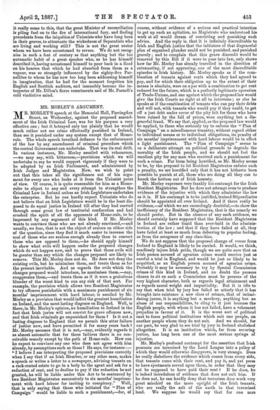TOPICS OF THE DAY.
ME. GLADSTONE'S SPEECH.
MR. GLADSTONE'S great speech of Tuesday night will probably be fixed upon by future historians as the text for a disquisition like one of those with which Lord Macaulay dilates on "the chequered spectacle" of Bacon's meteoric fate. It exhibited him, after a public life of fifty-five years of incessant labour, almost at the zenith of his power, and but for a voice which, though quite as rich, was not quite so clear and strong as it used to be, at the very zenith of his Parlia- mentary effectiveness ; and yet it indicated such a predominance in him of the tenacious advocate over the statesman, and such a singular wilfulness of purpose in overlooking and overleaping moral and constitutional obstacles of the gravest kind for what he claims as a moral and constitutional cause, as must bewilder the warmest admirers of his many great achievements, and make them ask themselves whether this is indeed the same man who in 1881 and 1882 stood so nobly between the Irish people and the unprincipled faction who regarded his Irish reforms as his worst offence against their treasonable hopes. Mr. Gladstone never displayed more skill than when be made much of the Parliamentary precedents for justifying such a measure as Mr. Balfour had on Monday asked leave to intro- duce, and maintained that the statistics of crime proved the exceptional powers asked for, to be altogether unjustified and unnecessary. Be never displayed more Parliamentary skill, we say, than in thus dilating on the infinitesimal in- crease in detected crime ; but he never displayed his tendency to lay stress on forensic points which a statesman should steadily ignore, more painfully than when he failed, from the beginning of his speech to the end of it, to take the smallest notice of the one great feature of the situation,—that for several years back the proportion of crimes detected and punished in Ireland to the number committed has been quite insignificant; that those who suffer, decline to bear evidence, even against those who injure them ; that the great majority of the people bow to an unjust authority behind the scenes of public life, rather than avail themselves of the provisions of a law which does not protect them; and that this evil, far from being on the decline, is steadily on the increase. The astute- ness with which Mr. Gladstone dwelt on the small increase in agrarian crime, and the completeness with which he ignored the plain and startling evidence that crime is no longer even com- plained of by the greater number of sufferers lest a worse thing should come to them, was not worthy of Mr. Gladstone's states- manship, and was flagrantly unworthy of that noble moral genius which he has from time to time displayed. He exhibited himself, too, in the very strange position of an accuser of the Irish Judges ; of one who treated their statements as not responsible statements, as "statements soaring into the region of speculation," and, indeed, virtually as distracting the public mind from the true features of the situation. Now, that is a most responsible attitude for a man in Mr. Gladstone's great position to assume. It lends his influence to the Irish attack on the present administration of justice. It is in its essence a purely destructive criticism. It gives the groat pres- tige of the Leader of the Opposition to the line adopted now for many years back by the National League and United Ire- land, of treating the Irish system of justice as a mere mass of injustice. Of course, Mr. Gladstone did not say this. But when he treats the Irish Judges as "soaring into the region of speculation" in respect to their statements, statements really most weighty, and indeed exact transcripts of the present con- dition of things, he does, in fact, throw his shield over the party who have attacked the Irish Courts with the utmost audacity and insolence as if they were mere instrument}, of oppression. Mr. Gladstone says that, in commenting on the reasons for the comparatively small number of offences, "the Judges may be right or wrong," but that " they carry no judicial authority whatever." Judicial authority, in the technical sense, perhaps not. But does Mr. Gladstone really mean to say that Judges who see and hear all that is going on in Ireland, who watch the open intimidation of jurors in which the papers of the League indulge, and read the reports of the illegal tribunals, are "soaring into the region of speculation" when they state the inferences which these facts, combined with their own experience, force upon them ? Look at the bare outline of the ease as stated in Mr. Goschen's masterly speech. Out of 1,064 agrarian crimes, there were only 64 convictions ; of 6 murderers, only 1 was convicted ; of 16
persons who were fired at, only I was able to get the offender punished; out of 21 burglaries, 17 remained unpunished ; out of 43 cases where a gun was fired into a private house, there was not a single offender identified ; out of 73 cases where cattle were mutilated, not a single offender was identified. Now, does Mr. Gladstone really mean to say that Judges are no more competent than any other Irishmen or Irishwomen to see the true bearing of these facts, and the light they throw on those private sessions of the tribunals of the National League at which the wretched Irish tradesmen and farmers and labourers make their humble submission to the League, and accept the penances imposed upon them for having ever offended that illegal tyranny before which they now come to grovel I If Mr. Gladstone seriously means that Judges and men of the world, who have watched witnesses and jurors all their lives, who read the Irish papers, and see for themselves how jurors shrink and how witnesses prevaricate lest they should bring on themselves the vengeance of the League, are not competent to draw the natural inference from what they see and hear, and are not bound to tell their opinion frankly to the public, we say that he has delivered a heavy blow against the moral authority of the Crown in Ireland, and lent his powerful arm to aid the work of dethroning the law there. If he does not mean this, nothing could be more dangerous, nothing more ill-considered, than to say anything which will be interpreted by every savage assailant of the Irish Judges and the Irish Courts as a sneer at the Judges for drawing an inference which their position lent them, in Mr. Gladstone's opinion, no more advantage for drawing correctly, than would have been possessed by any layman. We hold that Mr. Gladstone is utterly wrong ; that the Irish Judges can interpret the significance of such facts as we have mentioned with a certainty that makes it their positive duty to put forward the statements to which Mr. Gladstone refers, and which makes these statements for any reasonable mind twice as weighty as statistics themselves. And we hold that Mr. Gladstone, in depreciating these statements and treating them as mere speculations, has done what he can to shatter still further the already much-shattered fabric of Irish justice.
And yet there is one sentence in the great orator's speech which we regard with even greater amazement and deeper regret than this attack on the Irish Judges. It is the sentence in which, though he condemns as "a very bad and abominable outrage indeed" the insult to the Irish girl whose hair was out off while pitch was poured upon her head, he turns round upon the Irish Government and says :—" The right honourable gen- tleman, speaking in perfect simplicity, appeared to think that the removing the hair and the pouring pitch upon the head was a Nationalist invention. If he turns to his Irish history, he will find that it was an invention of the Government of Ireland. It was the practice of the soldiery and the yeomanry, in whose traditions some Members of the House have declared they glory, in the unhappy and disgraceful period preceding the unhappy incorporating Union." This was the passage which Professor Dicey, in the singularly eloquent but too bitter speech which he delivered at the Unionist dinner of Wednes- day, selected for indignant invective. And, indeed, we do believe that it will be the one passage which Mr. Gladstone may feel to his dying day something like remorse that his oratorical instinct betrayed him into delivering. Of course it was all trite, and of course a more mischievous bit of truth could hardly have been uttered by one in his position. If Mr. Dillon had said that such an outrage as this was nothing but the turning of the tables on the atrocities of the penal code, we should not have blamed him. Bat when the Minister who has so long laboured to reconcile Ireland and England, and who in his own belief is labouring to reconcile Ireland and England still, ventures to plead that for an outrage of this sort there is at least the excuse that it is borrowed from the wicked precedents which we set a hundred years ago, we do ask ourselves whether Mr. Gladstone has indeed become the leader of the Parnellites alone, and ceased to be the Minister who wishes to reconcile the two countries. To what purpose can it be to plead the wickedness of the Protestant party a hundred years ago as a palliation for a crime committed by Irish ruffians now, who have no experience of what their forefathers suffered, and only know that the ascendency of the Church which was regarded as partly responsible for that suffering, has been swept away by the justice of this generation Mr. Glad- stone is, indeed, taking up a new role when he hunts up the atrocities of our great-grandfathers as palliating the crimes of ruffians who have probably never heard of those atrocities, though they vent their savage spite on women who refuse to be the mere tools of their illegal combinations, Is
it really come to this, that the great Minister of reconciliation is piling fuel on to the fire of international fury, and finding precedents from the iniquities of Unionists who have long been in their graves, to attentuate the wickedness of Separatists who are living and working still? This is not the great orator whom we have been accustomed to revere. We do not recog- nise in such a feat of oratory as that anything but the too automatic habit of a great speaker who, as he has himself described it, having accustomed himself to pour back in a flood on his hearers that which he had absorbed from them as a vapour, was so strangely influenced by the eighty-five Par- nellites to whom he has now too long been addressing himself in imagination, that he had for the moment forgotten his English and Scottish auditors, and insensibly become the in- terpreter of Mr. Dillon's fierce resentments and of Mr. Parnell's cold vindictive mind.



































 Previous page
Previous page